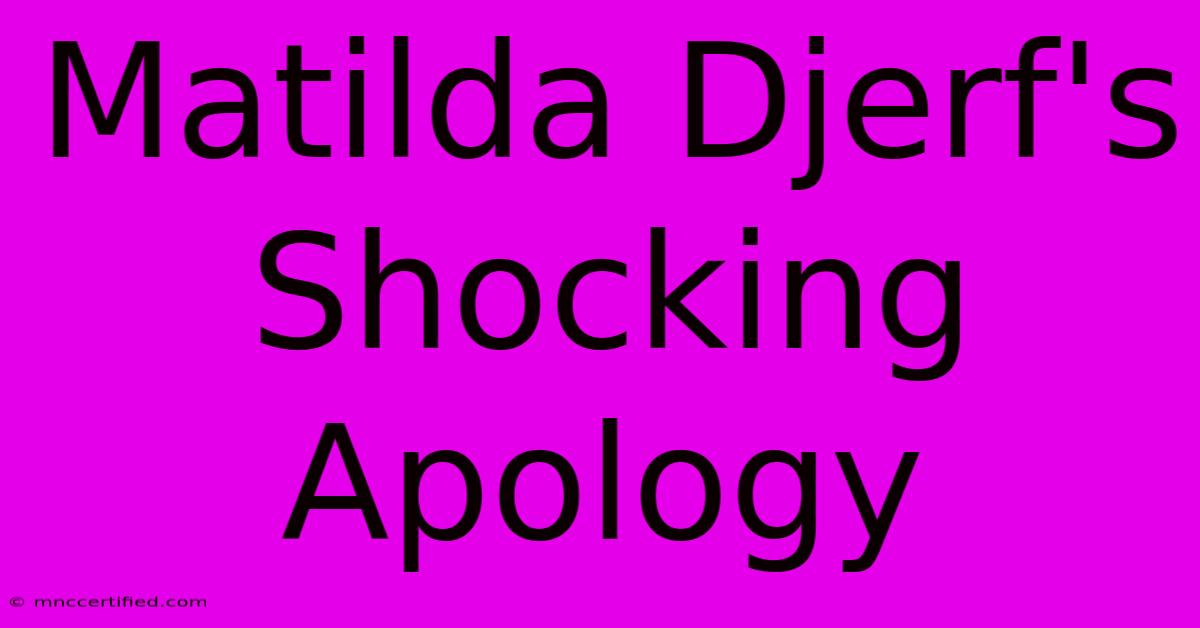Matilda Djerf's Shocking Apology

Table of Contents
Matilda Djerf's Shocking Apology: What Happened and Why It Matters
Matilda Djerf, the hugely popular Swedish influencer, recently issued a public apology that sent shockwaves through her massive online following. While apologies from influencers are relatively common, the nature of Djerf's apology and the subsequent reaction highlight the complexities of online influence and the ever-evolving expectations of accountability for public figures. This article delves into the details of the apology, explores the reasons behind the controversy, and examines its wider implications for the influencer landscape.
What Did Matilda Djerf Apologize For?
Djerf's apology, posted on her Instagram and other social media platforms, addressed accusations of cultural appropriation, misrepresentation, and tone-deaf marketing. While the specifics remain somewhat vague in her initial statement (a common tactic amongst influencers aiming for damage control), reports suggest the controversy stemmed from a series of posts and collaborations deemed insensitive by a significant portion of her audience. These accusations likely centered around her use of specific cultural imagery, clothing styles, and partnerships that were perceived as capitalizing on marginalized communities without proper understanding or respect. The lack of specific details in her initial apology fueled further speculation and criticism.
The Importance of Specificity in Public Apologies
The vagueness of Djerf's initial apology is a crucial point. A successful apology requires acknowledging specific mistakes and showing genuine remorse. A blanket statement lacking concrete examples leaves room for interpretation and often fails to adequately address the concerns of the offended parties. This ambiguity likely exacerbated the situation, turning a potential opportunity for reconciliation into a PR disaster. Transparency and accountability are key elements of effective damage control in the age of social media.
The Backlash and Subsequent Reactions
The initial reaction to Djerf's apology was mixed. While some followers accepted her explanation and expressed forgiveness, many criticized its lack of detail and perceived insincerity. The subsequent days saw a flood of commentary across various online platforms, with discussions focusing on the broader issues of influencer responsibility, the ethics of online marketing, and the impact of cultural appropriation on marginalized communities. The controversy rapidly expanded beyond Djerf's immediate fanbase, becoming a significant topic of conversation within the larger influencer community and beyond.
Analyzing the Public's Response: A Case Study in Online Accountability
The strong reaction to Djerf's apology highlights a growing trend: the public is demanding greater accountability from influencers. The days of simple apologies without concrete actions are over. Consumers, particularly younger generations, are increasingly discerning and expect influencers to act responsibly and ethically, holding them to higher standards of conduct. This case study underscores the importance of authentic engagement with one's audience and a willingness to learn and grow from mistakes.
Lessons Learned and Future Implications
Matilda Djerf's apology, while intended to mitigate damage, ultimately served as a powerful case study in the challenges of maintaining a positive public image in the ever-scrutinized world of social media influencing. The event highlights the critical need for influencers to:
- Prioritize cultural sensitivity: Thorough research and consultation are crucial before using imagery or themes from cultures other than one's own.
- Embrace transparency and accountability: Honest self-reflection and a willingness to learn from mistakes are paramount.
- Engage authentically with one's audience: Listening to feedback and addressing concerns constructively is key to maintaining trust.
This incident underscores the significance of ethical considerations in the influencer industry and the growing expectation that public figures will be held responsible for their actions. The long-term impact of Djerf's apology remains to be seen, but it undeniably serves as a valuable lesson for both influencers and their audiences alike. The future of influencer marketing hinges on a commitment to authenticity, responsibility, and a genuine understanding of the power of influence.
Keywords: Matilda Djerf, influencer apology, cultural appropriation, social media controversy, online accountability, influencer responsibility, ethical marketing, damage control, public relations, transparency, influencer backlash, social media ethics.

Thank you for visiting our website wich cover about Matilda Djerf's Shocking Apology. We hope the information provided has been useful to you. Feel free to contact us if you have any questions or need further assistance. See you next time and dont miss to bookmark.
Featured Posts
-
Could Bellinger Join The Yankees
Dec 18, 2024
-
Rising Death Toll In Vanuatu Earthquake 14 Confirmed
Dec 18, 2024
-
Djerf Avenue Founder Issues Apology
Dec 18, 2024
-
Matilda Djerfs Apology For Toxicity
Dec 18, 2024
-
Thames Rescue Dj Jordan North Video
Dec 18, 2024